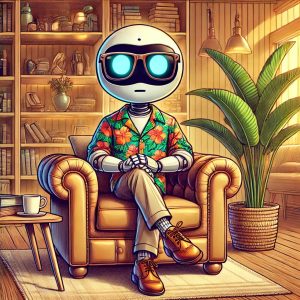 A recent study from Sentio University found that nearly half of people experiencing mental health challenges are turning to AI chatbots, such as ChatGPT, for support. AI can be helpful for structured interventions like Cognitive Behavioral Therapy (CBT), psychoeducation, and self-regulation strategies. Apps that guide breathing exercises, track moods, or even offer scripted relationship advice can provide useful tools for individuals and couples.
A recent study from Sentio University found that nearly half of people experiencing mental health challenges are turning to AI chatbots, such as ChatGPT, for support. AI can be helpful for structured interventions like Cognitive Behavioral Therapy (CBT), psychoeducation, and self-regulation strategies. Apps that guide breathing exercises, track moods, or even offer scripted relationship advice can provide useful tools for individuals and couples.
But here’s the thing: if these approaches worked on their own, my clients wouldn’t be in therapy. Many of the couples and individuals I work with have already tried self-help apps, mindfulness exercises, and AI-guided interventions. While useful, these tools often fall short because they lack the very thing that makes therapy transformational—real human connection.
The Human Edge: Why Therapy Is More Than Techniques
AI can analyze language, provide insights, and even simulate warmth. But what it cannot do is attune to the complex emotional dynamics in relationships. When couples struggle, it’s rarely just about communication techniques—it’s about how they experience each other emotionally. That’s something AI simply can’t perceive.
Transference, Countertransference, and the AI Gap
Transference happens in all relationships—it’s the way we unknowingly transfer past relationship experiences onto our current ones, including with our partners. In therapy, I notice countertransference—my emotional reaction to a client—which can help me understand deeper patterns at play.
Let’s say a couple comes to therapy because one partner always feels dismissed, and the other feels unfairly blamed. AI might suggest “active listening” techniques—but if I, as the therapist, start to feel pushed away or blamed, that reaction tells me something deeper is happening. The way I feel in the session often mirrors what happens in their relationship. That insight allows me to guide them toward real change—something an AI therapist could never detect.
AI as a Tool, Not a Therapist
AI can help couples learn skills, but therapy about more than skills—it’s about transformation. Couples don’t just need better conflict resolution tools; they need a space where they feel deeply heard and understood, where they recognize how their past experiences shape their present struggles.
So, while AI can support mental health and relationships in practical ways, it cannot replace the emotional depth, attunement, and real-time relational feedback that human therapists provide. The difference isn’t just what we do—it’s who we are. And no AI can replicate that.



